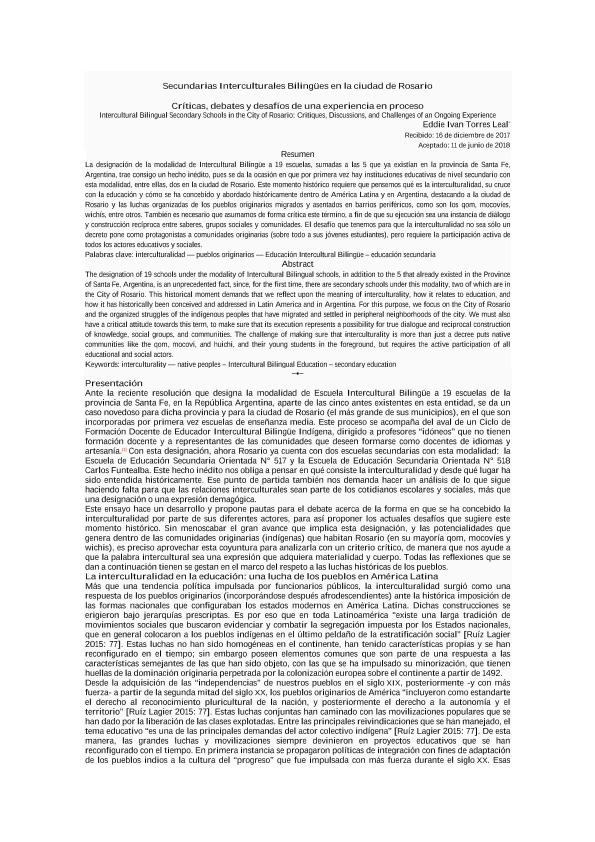Artículo
La designación de la modalidad de Intercultural Bilingüe a 19 escuelas, sumadas a las 5 que ya existían en la provincia de Santa Fe, Argentina, trae consigo un hecho inédito, pues se da la ocasión en que por primera vez hay instituciones educativas de nivel secundario con esta modalidad, entre ellas, dos en la ciudad de Rosario. Este momento histórico requiere que pensemos qué es la interculturalidad, su cruce con la educación y cómo se ha concebido y abordado históricamente dentro de América Latina y en Argentina, destacando a la ciudad de Rosario y las luchas organizadas de los pueblos originarios migrados y asentados en barrios periféricos, como son los qom, mocovíes, wichís, entre otros. También es necesario que asumamos de forma crítica este término, a fin de que su ejecución sea una instancia de diálogo y construcción recíproca entre saberes, grupos sociales y comunidades. El desafío que tenemos para que la interculturalidad no sea sólo un decreto pone como protagonistas a comunidades originarias (sobre todo a sus jóvenes estudiantes), pero requiere la participación activa de todos los actores educativos y sociales. The designation of 19 schools under the modality of Intercultural Bilingual schools, in addition to the 5 that already existed in the Province of Santa Fe, Argentina, is an unprecedented fact, since, for the first time, there are secondary schools under this modality, two of which are in the City of Rosario. This historical moment demands that we reflect upon the meaning of interculturality, how it relates to education, and how it has historically been conceived and addressed in Latin America and in Argentina. For this purpose, we focus on the City of Rosario and the organized struggles of the indigenous peoples that have migrated and settled in peripheral neighborhoods of the city. We must also have a critical attitude towards this term, to make sure that its execution represents a possibility for true dialogue and reciprocal construction of knowledge, social groups, and communities. The challenge of making sure that interculturality is more than just a decree puts native communities like the qom, mocovi, and huichi, and their young students in the foreground, but requires the active participation of all educational and social actors.
Secundarias Interculturales Bilingües en la ciudad de Rosario: Críticas, debates y desafíos de una experiencia en proceso
Título:
Intercultural Bilingual Secondary Schools in the City of Rosario: Critiques, Discussions, and Challenges of an Ongoing Experience
Fecha de publicación:
08/2018
Editorial:
Universidad Nacional de la Plata. Grupo de Estudios Sociales Marítimos
Revista:
Revista de Estudios Marítimos y Sociales
e-ISSN:
2545-6237
Idioma:
Español
Tipo de recurso:
Artículo publicado
Clasificación temática:
Resumen
Archivos asociados
Licencia
Identificadores
Colecciones
Articulos(IRICE)
Articulos de INST.ROSARIO DE INVEST.EN CS.DE LA EDUC. (I)
Articulos de INST.ROSARIO DE INVEST.EN CS.DE LA EDUC. (I)
Citación
Torres Leal, Eddie Ivan; Secundarias Interculturales Bilingües en la ciudad de Rosario: Críticas, debates y desafíos de una experiencia en proceso; Universidad Nacional de la Plata. Grupo de Estudios Sociales Marítimos; Revista de Estudios Marítimos y Sociales; 11; 13; 8-2018; 1-8
Compartir




